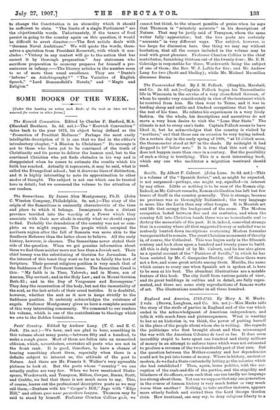Poets' Country. Edited by Andrew Lang. (T. C. and E.
C. Jack. 215. net.)—We hear, and are glad to hear, something in this volume about many poets,—between fifty and a hundred, to make a rough guess. Most of them are fallen into an unmerited oblivion, which, nevertheless, overtakes all poets who are not in the front rank. It is good, therefore, to have a chance of 'hearing something about them, especially when there is a definite subject to interest us, the attitude of the poet to Nature. And there are Mr. Francis S. Walker's very agreeable pictures to look at. But the poets whose " country " we can actually realise are very few. When we have mentioned Shake- speare, Wordsworth, and Tennyson, Milton, Cowper, Burns, Scott, and Crabbe, we feel that there is not much more to say. This, of course, leaves out the professionardescriptive poets as we may call them,—Denham with his "Cooper's Hill," Jago with "Edge Hill," and others quos mow perscribere iongum. Thomson may be said to stand by himself. Professor Churton Collins goSs, we cannot but think, to the utmost possible of praise when he says that Thomson is "minutely accurate" in his descriptions of Nature. That may be justly said of Tennyson, whom the same writer fully appreciates ; but the two poets are certainly "accurate" in very different ways. The subject, however, is too large for discussion here. One thing we may say without hesitation, that all the essays included in the volume may be read with great pleasure. Professor Churton Collins is the chief contributor, furnishing thirteen out of the twenty-four; Mr. E. H. Coleridge is responsible for three, Wordsworth being the subject of one of them ; the Rev. W. J. Loftie for five ; and Mr. Andrew Lang for two (Scott and Shelley); while Mr. Michael Macmillan discusses Burns.






































 Previous page
Previous page